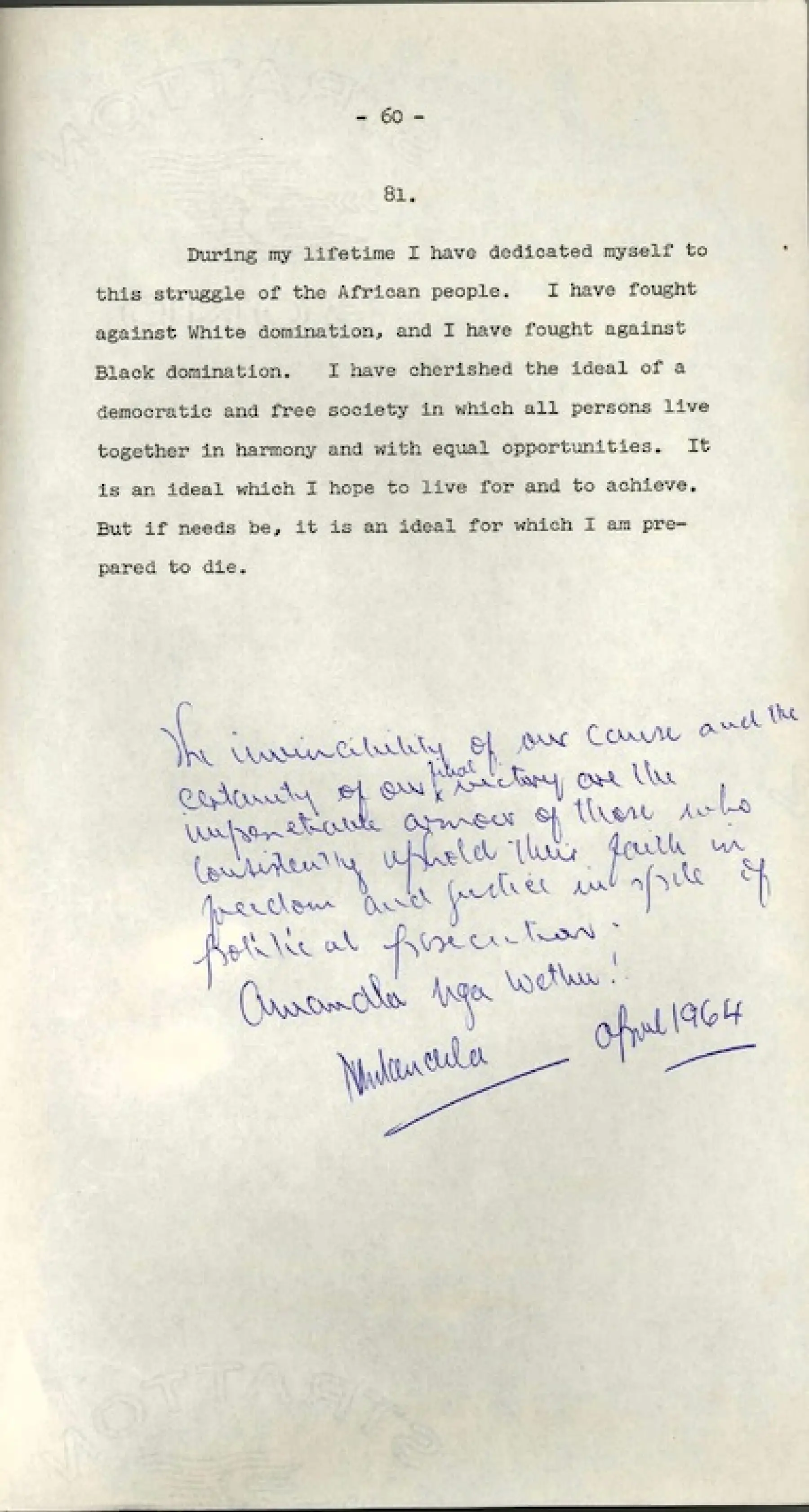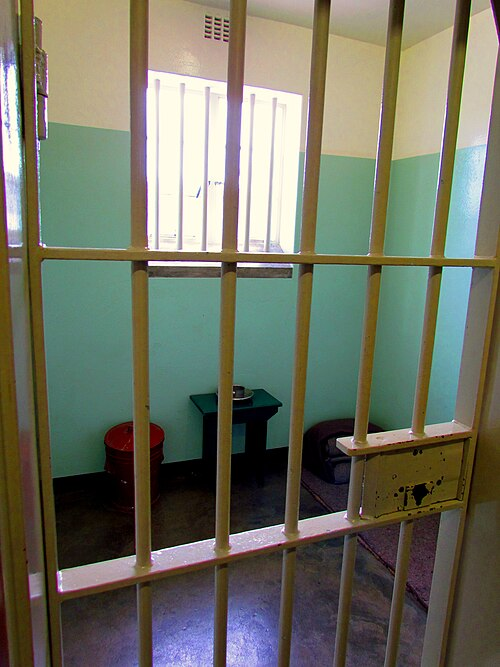IB Syllabus focus:
'The events leading to the Rivonia trial.
The conduct, outcome, and international reaction to the trial.
The implications of the trial's outcome for the anti-apartheid movement and South African politics.'
The Rivonia Trial remains an indelible mark on the annals of South African history. Beyond a legal proceeding, it was a definitive clash between an oppressive regime and those advocating for justice, equality, and freedom.
Events Leading to the Rivonia Trial
Background
Growing Tensions: During the early 1960s, there was increasing frustration among anti-apartheid activists. This was a time marked by relentless state oppression and dwindling hope for peaceful negotiations. As the South African government continued to tighten its grip, the ANC and its allies faced pivotal choices.
Shift from Non-violence: Initially, the ANC had staunchly maintained a policy of non-violence. However, the Sharpeville massacre in 1960 and subsequent government crackdowns compelled many within the movement to reconsider. There was a growing sentiment that passive resistance was ineffective against a regime unyielding in its use of violence.
The Birth of Umkhonto we Sizwe (MK)
Formation: In 1961, the ANC, in collaboration with the South African Communist Party, established MK, translating to "Spear of the Nation". Nelson Mandela, among others, played a pivotal role in its creation.
Sabotage Acts: The MK's operations primarily focused on acts of sabotage. They targeted government infrastructures like railway lines, electricity pylons, and communication facilities. It was a calculated strategy to disrupt but not destroy, ensuring minimal human casualties.
Liliesleaf Farm Raid
Importance of Liliesleaf: Situated in Rivonia, a suburb of Johannesburg, Liliesleaf Farm served as a covert operational base for many anti-apartheid leaders. Meetings, strategising, and planning, including for potential guerrilla warfare, took place here.
The Raid: On 11 July 1963, South African police swooped down on Liliesleaf, acting on a tip-off. They arrested several key figures and unearthed documents detailing MK's plans for further sabotage and potential armed revolution.
Conduct of the Trial
Charges and the Accused
Facing the Gallows: The arrested individuals were slapped with severe charges, including sabotage, which had the potential penalty of death. Among the accused were luminaries like Nelson Mandela, Walter Sisulu, Govan Mbeki, Denis Goldberg, and others.
Defence Strategy: Joel Joffe, Bram Fischer, and other lawyers representing the accused devised a strategy that aimed not just to defend their clients but to place the apartheid system itself on trial. They sought to highlight the moral and political justification for resistance.
Mandela's Statement
Historic Moment: During the trial, Nelson Mandela delivered what would become one of the most iconic speeches of the 20th century. Declaring, "I am prepared to die," he masterfully articulated the reasons for the ANC's shift to armed resistance and painted a vision of a free, democratic, and inclusive South Africa.

The final page of Nelson Mandela’s 20 April 1964 dock statement, ending with the words “it is an ideal for which I am prepared to die.” As a primary source, the document illuminates the legal and moral rationale the defense advanced against apartheid. Source
The Verdict
Guilty as Charged: On 12 June 1964, the trial culminated with a guilty verdict for most of the accused. It was a foregone conclusion for many observers, given the political nature of the trial.
Sentences
Life Imprisonment: Although many feared the death penalty, the judges handed down life sentences. This decision was likely influenced by international concerns, with the South African government wary of creating martyrs.
Global Response
Widespread Condemnation: The international community widely condemned the Rivonia Trial's outcome. Demonstrations were held in cities from London to New York, with protestors demanding the release of the accused.
United Nations & Global Powers: The UN and various countries, including several Commonwealth nations, decried the verdict. The trial intensified the scrutiny on South Africa's apartheid policies, leading to stronger calls for sanctions and boycotts.
Implications for the Anti-Apartheid Movement and South African Politics
Momentum in the Movement
Bolstered Determination: Far from dampening spirits, the trial invigorated the anti-apartheid movement. The sacrifices and resilience of the Rivonia accused became emblematic of the broader struggle, inspiring many to join the cause.
Transition in Leadership
Roles Redefined: With top leaders incarcerated, the anti-apartheid movement underwent restructuring. Oliver Tambo's leadership in exile became crucial in maintaining international focus on apartheid and mobilising support.
Robben Island
A Bastion of Resistance: The accused were incarcerated in Robben Island, a notorious prison. Yet, within its confines, they transformed it into a hub of education, debate, and strategy, furthering the anti-apartheid cause even from behind bars.

Nelson Mandela’s cell in the Maximum Security Prison on Robben Island, where he was held from 1964 to 1982. The austere conditions coexisted with an intense culture of study and political discussion that sustained the movement’s leadership in captivity. The image depicts the cell interior rather than communal study areas. Source
Heightened Global Involvement
Increased International Pressure: Post-trial, global initiatives against apartheid amplified. Many countries imposed sanctions, artists boycotted South African events, and universities across the world shunned collaborations with South African institutions.
The Rivonia Trial, while an attempt by the apartheid regime to quash resistance, inadvertently sowed the seeds of its own demise. The imprisoned leaders, particularly Mandela, became global symbols of the anti-apartheid struggle, ensuring the fight against racial segregation in South Africa remained in the world's consciousness.
FAQ
The defence team during the Rivonia Trial comprised several courageous lawyers, including Joel Joffe and Bram Fischer. Their strategy was multifaceted. Firstly, they intended to challenge the credibility of state witnesses and the legality of evidence obtained during the Liliesleaf raid. Secondly, and more significantly, they aimed to turn the trial into a platform to expose the moral bankruptcy of the apartheid regime. They sought to showcase that the accused were driven to their actions due to the systemic injustices of apartheid and not out of any malicious intent. This strategy aimed at not just defending their clients but also spotlighting the broader cause of the anti-apartheid movement.
Several key figures in the anti-apartheid movement were arrested and tried alongside Nelson Mandela during the Rivonia Trial. Some of these luminaries included Walter Sisulu, a senior member of the ANC; Govan Mbeki, an ANC activist and father of future South African President Thabo Mbeki; Raymond Mhlaba, an ANC and SACP member; Denis Goldberg, a white South African who was an ally of the ANC and a member of the MK; and Elias Motsoaledi and Andrew Mlangeni, both of whom were ANC activists. Each played a significant role in the anti-apartheid struggle and faced the possibility of the death penalty during the trial.
Despite the restrictions imposed on them, the accused managed to clandestinely communicate with the outside world using various means, including secret messages and coded letters. These communications served multiple purposes. Firstly, they were a source of morale boost, allowing the prisoners to receive updates and words of encouragement. Secondly, they allowed the accused to communicate their stance, beliefs, and justifications to a broader audience, thus amplifying the cause of the anti-apartheid movement. These communications, especially Mandela's public statements, played a crucial role in shaping public opinion, both domestically and internationally, against the apartheid regime.
Yes, there were several individuals involved in the activities at Liliesleaf who managed to evade capture during the raid. One notable figure was Harold Wolpe, a key member of the SACP and a lawyer. Wolpe was deeply involved in underground activities against the apartheid regime. After the Liliesleaf raid, he was detained but managed to escape from Marshall Square police station in Johannesburg along with three others: Arthur Goldreich, Mosie Moolla, and Abdulhay Jassat. Wolpe subsequently fled to Swaziland and then to England. The escape was a significant embarrassment for the apartheid authorities and served as a beacon of hope and resilience for the anti-apartheid movement.
Liliesleaf Farm, situated in Rivonia, was more than just a piece of land; it was the nerve centre of covert operations for anti-apartheid leaders. The farm acted as a safe house for activists, where they could plan, strategise, and debate without the immediate threat of government surveillance. Given the intensified crackdown on opposition figures, having such sanctuaries was paramount. At Liliesleaf, key leaders like Nelson Mandela clandestinely plotted the path forward, including discussions on potential guerrilla warfare. The raid on Liliesleaf and the subsequent capture of critical documents and leaders precipitated the Rivonia Trial, making the farm's role in anti-apartheid history undeniable.
Practice Questions
The Rivonia Trial, held between 1963 and 1964, was a watershed moment in the anti-apartheid movement. Not only did it highlight the repressive lengths the South African government was willing to go to silence opposition, but it also amplified the international focus on apartheid. The trial transformed the accused, particularly Mandela, into emblematic figures of resistance. Their dignified defence and Mandela's iconic "I am prepared to die" speech showcased the moral superiority of the anti-apartheid stance. Ultimately, while intended to cripple the movement, the trial inadvertently galvanised both domestic and international opposition to apartheid.
The conduct and outcome of the Rivonia Trial were pivotal in shaping international perceptions of apartheid. The trial's blatant political undertones, underscored by the severity of the charges and the potential for the death penalty, drew widespread international attention. The dignified defence by the accused and Mandela's poignant articulations showcased the stark contrast between the oppressors and the oppressed. The verdict, though resulting in life sentences instead of the feared death penalty, was widely condemned. Protests erupted globally, and the UN, alongside other countries, decried the trial's outcome. This period intensified international scrutiny of South Africa, accelerating calls for sanctions and boycotts against the apartheid regime.

